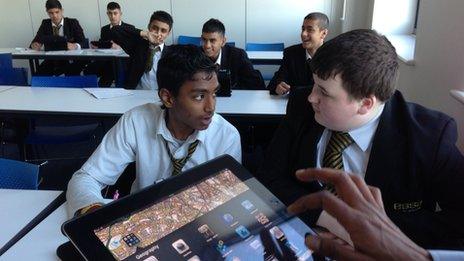iSchool - can tech really deliver education?
- Published
- comments

I have a great job. It has allowed me to visit some of the cleverest technology companies around the world and meet many of those shaping our future, from Amazon's Jeff Bezos to Mark Zuckerberg of Facebook. But I can't remember many more inspiring visits than my day at a school in Bolton or a more engaging technology enthusiast than a teacher called Abdul Chohan.
I had come to the Essa Academy to prepare a radio report on the impact of technology in schools, which will be broadcast on the Today Programme after Christmas. I was here because this school has been a pioneer in giving every child a mobile device and then building its delivery of lessons around that.
But as I arrived and signed in on an iPad I was in somewhat sceptical mood. Over the years there have been plenty of examples where large sums of money have been invested in technology which has soon proved to be of little practical use, with poorly trained teachers rapidly becoming disillusioned. Remember language laboratories - or more recently the drive to put electronic whiteboards in every classroom?
But to meet Abdul Chohan is to have one's cynicism swept away. This chemistry teacher, who returned to his home town after working in the pharmaceutical industry, is one of nature's enthusiasts and the driving force behind the technology programme at Essa Academy.
Three years ago the 900 students were each given an iPod Touch, and this term they have been replaced with iPads. They use the devices in class, and at home, with lessons and homework delivered to them mainly through the iTunes U platform.
As we wandered from the science department to the art room to a geography lesson, he pointed out what was different about this school's approach. Instead of interactive whiteboards - "they're hardly ever interactive" said Abdul - there were TV monitors on which the content from the teacher's or the students' iPads could be projected.
In a maths lesson one teacher had set a test on the tablets and was using an app which could monitor live each pupil's progress through the answers. Two thirds were doing fine, the other third needed more help.
Elsewhere, a science teacher was discussing the effect of alcohol on the human body. "The students have already downloaded the lesson earlier in the week," Abdul explained, "so they're coming in with information. What the teacher does now is question their understanding of that information."
What was a failing school in a deprived area has, he insists, been transformed by a new building and a new approach to learning, with a dramatic improvement in the GCSE results achieved by students.
I had plenty of questions about this approach. What was the rate of loss of these expensive items carried to and from school? About 6% per annum, Abdul told me, which was manageable. What about the overall cost of all this kit? Both Abdul and the Principal Showk Badat insisted it had been quite cost-effective. Photocopying expenses had plunged, with far fewer worksheets printed, and the cost of managing student behaviour was dramatically lower. With pupils more engaged, there had been a big improvement in their conduct at school.
But one question may have struck many readers - is it wise for any school to put all of its technology into the hands of one company, Apple? For years this and other schools put similar faith in Microsoft products, and the results were not always to their benefit.
When I asked Abdul Chohan about this he shrugged his shoulders and said it was merely a matter of practicality. It was the ecosystem behind the iPads that mattered rather than the devices - and the iTunes U platform which allowed the school to put so many teaching resources online was much cheaper than the Virtual Learning Environments that many schools use.
Now it is too early to say that the Essa Academy is a template for how all schools should use technology. After all, the iPads have only recently been handed to all students, and we may find that when the novelty wears off they prove rather less successful in making education more engaging.
As part of my report for the Today programme I'm also speaking to a teacher at another school who is worried that technology is a distraction rather than an aid for pupils in her English literature lessons.
But I came away from my day in Bolton with a spring in my step. Meeting teachers and pupils who were all so enthusiastic about the work they were doing together was a reminder of the impact technology can have on our lives - when it works.